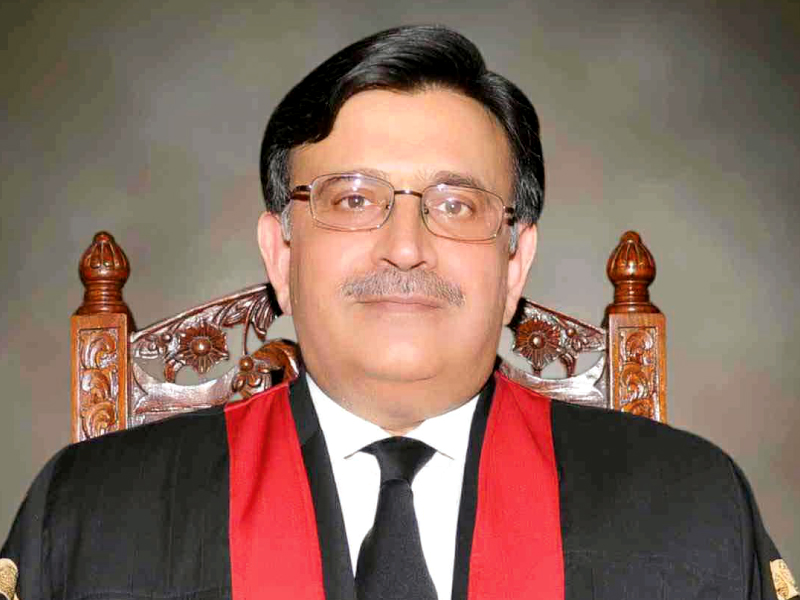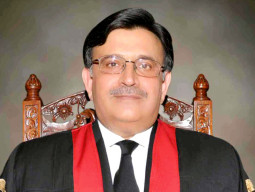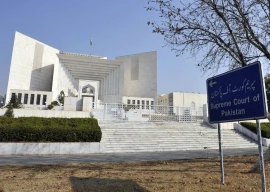
Chief Justice of Pakistan Umar Ata Bandial on Thursday remarked that the doors of the court were open for those who criticised judges.
He added that those who criticised the judiciary must have been “hurt”.
A five-judge larger bench, headed by CJP Bandial, was hearing a presidential reference seeking the interpretation and scope of the Constitution’s Article 63-A.
The top judge further said many people and this bench stood for the Constitution.
The top judge’s remarks came on the statement of PPP lawyer Senator Raza Rabbani that constitutional office-holders had subverted the Constitution and maligned institutions.
Rabbani told the court that it was evident from history that when civilian institutions were maligned, it had two consequences -- either the country headed towards the soviet union or fascism.
However, the CJP asked him not to say that. “When the truth comes to the surface, then things become clear,” he added.
The CJP told Rabbani that history told them that the PPP had conducted itself with fortitude and despite giving many sacrifices, always supported the Constitution. “We have respect for the PPP,” he added.
During the hearing, PTI counsel Barrister Ali Zafar in his arguments contended that even though if a defector was allowed to participate in the no-confidence motion, their vote could not be counted.
Zafar argued that the court must consider the unanimity on the point that Article 63-A declared that the voting in the House contrary to the directions issued by the parliamentary party was a violation and even an offence.
Read more: SC will only focus on Suri’s ruling: CJP
Quoting the law, he pointed out that in case it was proven that monetary or other considerations were obtained, then Article 62(1)(f) shall apply and the member would no longer be qualified to contest the next elections because they had committed an act of disloyalty.
Zafar posed the question whether or not the votes of a parliamentary party’s members, who cast them against the directions of their party, could be counted at all in a resolution for a vote of no-confidence.
He added that the courts were not equipped with many moralities for the construction of constitutional provisions.
“One of the approaches to adopt the literal meaning is the textual approach and the other approach is structural methodology i.e. purposive interpretation of constitutional interpretation,” he added.
Zafar said that in the light of Justice (retd) Azmat Saeed’s judgement in the case reported as PLD 2018 SC 105, the court could not read into the Constitution.
However, he argued that the courts could mold and creatively interpret constitutional provisions in the light of the principle that constitutions are heirs of the past as well as testators of the future.
While highlighting Pakistan’s constitutional history, he told the court that when former premier Zulfikar Ali Bhutto was, preparing the 1973 Constitution, he came to the opposition and asked them to give him a counter-clause to the vote of no confidence clause at least for 10 years for democracy’s sake. According to Zafar, Bhutto knew that in case his party members left him at some point, then he could be ousted out of the government through a vote of no-confidence. So he proposed to the opposition to insert an article in the Constitution providing that minority votes in the vote of no-confidence shall not be counted at all.
The opposition agreed to the proposal and in return got fundamental rights enshrined into the 1973 Constitution.
Zafar contended that a member who had committed the acts prescribed in Article 63-A contrary to the directions issued by the parliamentary party to which they belonged to, then the person would be breaching the trust reposed in him by the people who elected him and as well as his parliamentary party.
He then compared the definitions of disloyalty and dishonesty with each other in accordance with the definitions contained in different dictionaries.
He argued that disloyalty has been defined as being faithless, traitorous, betrayal by the intentional actions or omissions of a trusted person and that disloyalty has been said to be akin to dishonesty and even theft.
He therefore suggested that “disloyalty” is synonym with treachery, breach of trust, double dealing, falsity, infidelity, unfaithful, falseness, betrayal of trust, deceitfulness and breaking of faith.
Zafar then raised an argument that since disloyalty is linked with trust, therefore it would entail a betrayal of fiduciary duty as well.
For this he gave examples of lawyers and doctors who put their interest above those of their “clients and patients”, then that was a betrayal of trust of the highest nature.
He argued that the fiduciary relationship that a member of parliament had with their party and with the people was of a similar nature that did not require any contractual trust.



1727778647-0/diddy-(16)1727778647-0-165x106.webp)

1732014631-0/BeFunky-collage-(71)1732014631-0-165x106.webp)




1732011525-0/Express-Tribune-(8)1732011525-0-270x192.webp)
1732004108-0/Express-Tribune-(5)1732004108-0-270x192.webp)








COMMENTS (7)
Comments are moderated and generally will be posted if they are on-topic and not abusive.
For more information, please see our Comments FAQ